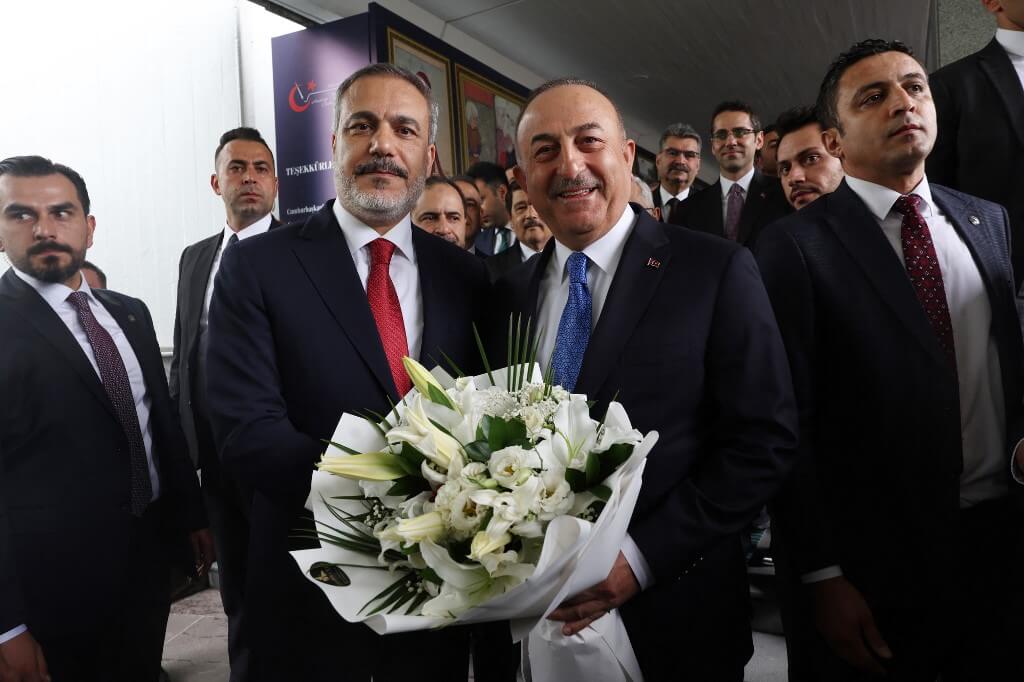Hakan Fidan, the head of Turkey’s National Intelligence Organization (MİT) and a controversial figure whose tenure has been marked by allegations of torture, enforced disappearance, abduction, rendition and the forced repatriation from abroad of numerous critics of President Recep Tayyip Erdoğan, took the helm of Turkey’s foreign ministry on Monday.
Fidan, once a figure in the background with his voice known only to a few, on Monday took over the office from Mevlüt Çavuşoğlu during a handover ceremony held in the courtyard of the Ministry of Foreign Affairs building in Ankara. He stepped into the public spotlight with a speech, standing side-by-side with Çavuşoğlu.
“After 13 years of service at the National Intelligence Organization, I express my gratitude to President Erdoğan for his trust in me by appointing me to the Ministry of Foreign Affairs, which carries an equally significant responsibility. … With Mr. Çavuşoğlu, we have successfully carried out critical duties with great harmony and trust,” Fidan said.
Kamuoyu Hakan Fidan'ın konuşmasını ilk kez dinledi: pic.twitter.com/diGwCTYcRP
— Seçim 2023 (@secimtr2023) June 5, 2023
Fidan served as undersecretary of MİT from 2010 to 2023.
MİT’s abductions
The former spy chief was alleged to be behind the abduction of scores of Turkish dissidents abroad through various methods, with kidnappings and forced renditions being mostly of individuals suspected of links to the faith-based Gülen movement, inspired by the views of Islamic cleric Fethullah Gülen.
Local mafia groups and intelligence organizations were reportedly employed in the abductions that occurred mainly in African, Balkan and Southeast Asian countries.
The Gülen movement is labelled as a terrorist organization and accused by the Turkish government of masterminding a failed coup on July 15, 2016, which was suppressed overnight and claimed the lives of 251 people. The movement, which strongly denies involvement in the failed putsch or in any terrorist activity, has been facing an unprecedented crackdown on its members, which escalated after the coup attempt.
MİT confirmed in its yearly report for 2020 that it had conducted operations for the forcible return of more than 100 people with alleged links to the Gülen movement.
“… [M]ore than 100 members of the [Gülen movement] from different countries were brought to Turkey as a result of the [agency’s] increased operational capacity abroad,” the report said.
Role in July 15 coup
Although many blamed MİT and Fidan for their failure to prevent the coup attempt by informing the government about it in a timely fashion, Fidan, as well as then-army chief Hulusi Akar, did not appear before a parliamentary inquiry committee regarding the coup attempt and did not testify in court during coup trials.
This was despite the apparent failure of the Turkish intelligence to gather information about the coup plans. No intelligence official has resigned or been fired by the government, either.
Among the questions still persisting as to what happened before and after the coup attempt is why Fidan informed neither Erdoğan nor then-prime minister Binali Yıldırım although it turned out that he had learned about the coup attempt seven hours before they did.
It was also revealed in 2017 that Akar and Fidan had a six-hour meeting in Ankara a day before the failed coup.
Torture allegations, enforced disappearances
Following the coup attempt, Fidan’s tenure was also marked by allegations of enforced disappearances of government opponents and their torture at the hands of MİT agents.
Enforced disappearances, common in Turkey during the 1990s, made a comeback following the coup attempt.
A recent report from human rights group the Advocates of Silenced Turkey (AST) documented at least 30 instances of enforced disappearance where individuals, largely in Ankara, were whisked away in black transporter vans, in what the report describes as the “Black Transporter” cases. Several victims who were subsequently found reported being tortured during their enforced disappearances, pointing the finger at MİT. Almost all of them were accused of links to the Gülen movement. Some victims who are still missing are feared to have been killed.
False flag for war on Syria
Fidan surprised many when he was heard in an audio clip, the authenticity of which was confirmed by a Turkish court in 2021, suggesting a shocking method to create an excuse for a war on Syria.
The audio clip dates back to March 13, 2013, when then-foreign minister Ahmet Davutoğlu, then-foreign ministry undersecretary Feridun Sinirlioğlu, then-deputy chief of general staff Gen. Yaşar Güler and Fidan are heard discussing military operations in Syria in Davutoğlu’s Foreign Ministry office.
Fidan says in the recording: “If needed, I would dispatch four men to Syria. [Then] I would have them fire eight mortar shells at the Turkish side and create an excuse for war.”
The Turkish government blamed the leak of the audio clip on the Gülen movement, although an investigation failed to provide any evidence to that effect and found nobody from the group who might have been involved in the leak.
While the opposition accused the government of planning a “provocation” involving Syria that had been exposed on social media, then-prime minister Erdoğan confirmed the security meeting at a public rally in Diyarbakır.
Instead of questioning the false flag that would drag NATO’s second largest army into a war in Syria, Erdoğan said the wiretapping of his foreign minister’s office was “immoral,” an act of “cowardice,” “dishonest” and “mean.”

